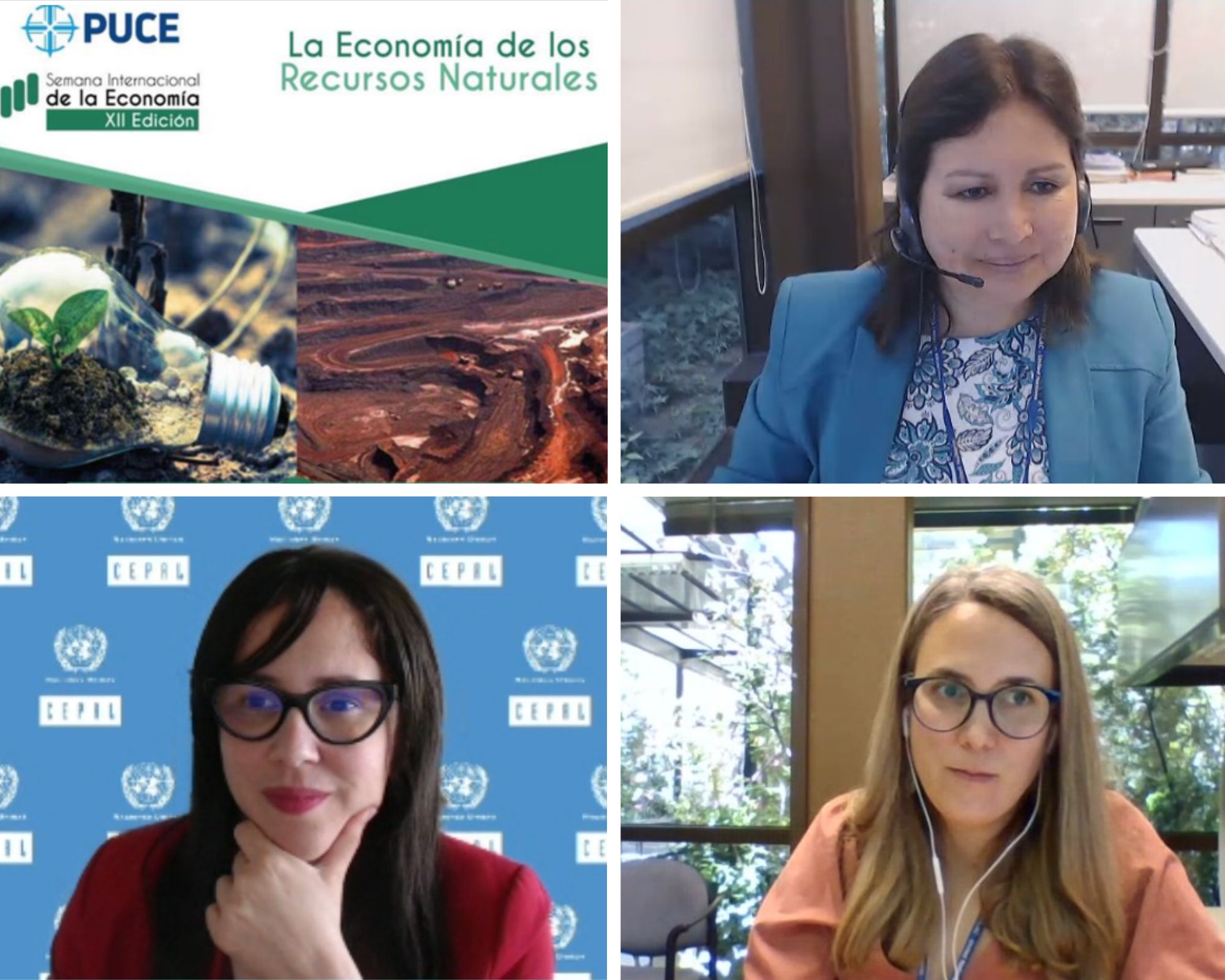Briefing note
ECLAC participates in the XII Edition of the International Economic Week – The Economics of Natural Resources
Dr Jeannette Sánchez, Director of the Natural Resources Division, participated through her presentation on the role of natural resources in sustainable development in Latin America and the Caribbean. In this regard, she highlighted important milestones of the last two decades such as lower GDP growth, higher interest rates, exchange rate variability and price fluctuations, which have affected the countries of Latin America and the Caribbean. Similarly, she identified aspects such as low investment, and the delay of two decades in extreme poverty levels, as part of the region's structural problems. In this context, Dr Sánchez highlighted the wide diversity of natural resources (renewable and non-renewable) that the region has and that can contribute to the sustainable and inclusive development of the countries, provided they are properly managed. On the other hand, the dependence on natural resources increased, as well as the export of biomass and minerals. Although the export boom of primary resources and prices contributed to the reduction of poverty at the beginning of the century, the region registers high socio-environmental conflict, especially in sectors such as mining, water, forests and fossil fuels; as well as a setback in social indicators.
In this sense, there are several structural challenges to be resolved: 1) Overcoming poverty and inequality; 2) Face the external constraints; 3) Combar environmental unsustainability, for which ECLAC proposes: a) a new style of development that takes advantage of knowledge, technology and social capital to encourage sustainable development; b) a structural change with equality through a strategy called the Big Implementation for Sustainability, taking into account aspects such as the energy transition, electromobility, digital industry, bioeconomy, among others; c) consider natural resources as an opportunity, for which primary export specialization must be encouraged, developing economic fabrics and more complex, inclusive and dynamic value chains. At the national level, governance of natural resources and associated services must be promoted through a comprehensive sustainable development strategy, which allows for a just socio-ecological transition to be achieved. At the macro and sectoral level, economic diversification and value addition should be encouraged, with the construction of public policies and other mechanisms that contribute to reducing vulnerability to internal shocks and the generation of knowledge to increase efficiency in the use of naatural resources.
Next, the magisterial talk related to water issues was presented, which was in charge of Dr Silvia Saravia Matus, Economic Affairs Officer of the Water and Energy Unit. Dr. Saravia Matus presented the panorama of water resources in Latin America and the Caribbean, and the ECLAC proposal for a sustainable water transition. In the first place, the doctor spoke about the situation of water availability, the scenarios of water scarcity that have been magnified by the impact of climate change, and the regional challenges related to the institutional and territorial dispersion of water governance, which hinders effective coordination, and also regional inefficiency in wastewater treatment and the coupling trends between water extraction and GDP. Likewise, Saravia Matus presented the different management models in the drinking water and sanitation sector, as well as strategies to mobilize public and private investment, highlighting the differences between delivery models in urban and rural areas. Additionally, Saravia Matus highlighted the urgency of closing the infrastructure gaps to serve at least 17 million people in the region without basic drinking water service, and 72 million people without basic sanitation service.
In the second part of the presentation, Dr Saravia Matus presented ECLAC's proposal for a sustainable and inclusive water transition that is based on four pillars of action that at the same time generate substantial economic, social and environmental benefits; 1) Universalize access to safely managed drinking water and sanitation, leaving no one behind, 2) Ensure greater equity in the affordability of the service, 3) Reduce negative externalities related to pollution, overexploitation and conflicts and 4) Transform the current linear management of water in a circular water management. She then detailed the benefits of driving the transition forward, using the SDG 6 global acceleration framework, which is based on five pillars; financing, data and information, capacity development, innovation and governance. A central message is that the mobilization of 1.3% of regional GDP over the next 10 years would allow the creation of 3.6 million jobs each year.
Finally, Dr Saravia Matus concluded that water management must respond to the public interest, prioritizing human consumption and the conservation of ecosystem services, followed by subsistence activities and other productive activities. She explained the importance of extraction price signals and fines in the face of negative impacts on the environment so that they reflect all costs and are sensitive to water availability and its variations. She also highlighted the importance of having control and monitoring systems for basins and their flows to promote a greater sense of responsibility in use. To close, Dr Saravia Matus invited the audience to participate in the 2023 Water Dialogues, a regional preparatory activity for the 2023 United Nations Water Conference.
In a third slot, Dr Marina Gil Sevilla, Senior Assistant for Economic Affairs of the Water and Energy Unit, presented the diagnosis of the energy sector for LAC, including relevant information on energy poverty, to later introduce the sustainable and inclusive energy transition proposal for the region. Emphasis was placed on the conformation of the regional energy matrix, dominated by fossil fuels, an aspect that contributes to a great extent to global warming through the emission of greenhouse gases and pollutants. She emphasized the opportunity presented by the transportation sector as the main final energy consumer, followed by the industrial and residential sectors. She highlighted that fossil fuels generate around 60% of electricity, an aspect that could be optimized with investments in renewable energies with a high impact on reducing CO2 emissions, mainly from the transportation sector. In this regard, he also pointed out that, although LAC is one of the regions with the highest proportion of modern renewable energy in final energy consumption, this is thanks to hydroelectric generation, bioenergy consumption in industrial processes, and the use of biofuels in transportation, as well as other important sources such as solar and wind power, have not yet succeeded in surpassing fossil sources in share, so work must still be done on public policies that encourage energy generation through renewable sources.
In relation to energy poverty, Dr Gil emphasized that it is necessary and urgent to facilitate access to energy with equity, quality and to satisfy the basic needs of the territory, these being fundamental aspects to sustain the human and economic development of the region. To achieve this, she pointed out that it is important to have stable energy services, efficient technologies, fair prices and other mechanisms that guarantee access to electricity and clean cooking systems, among others.
On the other hand, the ECLAC proposal for the energy transition for the region was presented, understood not only as the progressive replacement of the use of fossil and nuclear energy by renewable energy sources, but also as a process in which public policies, institutions and governance should be strengthened. To realize the above, the ECLAC proposal was presented, made up of five pillars, which are: i) Increasing renewable energy in the matrix; ii) Universalize access to electricity based on renewables and reduce energy poverty; iii) Increase the efficiency of energy systems; v) Increase regional energy security and resilience to external shocks; iv) Strengthen complementarity, integration and interconnection between the region's energy systems and, and v) Increase regional energy security and resilience to external shocks.
Finally, public policies to accelerate the energy transition were highlighted, which must consider the new renewable industry as well as other emerging industries and that can contribute to the energy transition without leaving anyone behind: 1) boost investment, 2) universalization of electrification based on renewables, 3)boost the demand for renewables, 4) increased energy efficiency, 5) value chains, 6) financing, 7) governance, participation and public-private partnerships, and 8) long-term planning term and regional energy integration.



